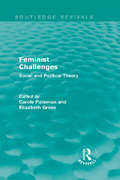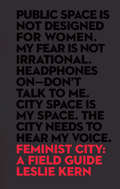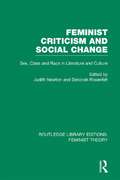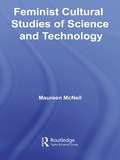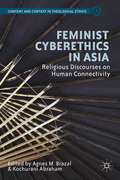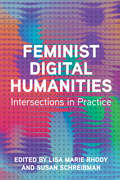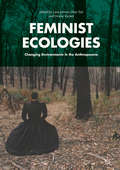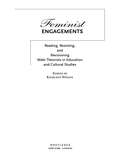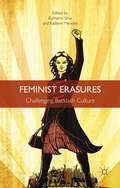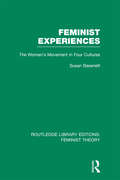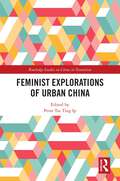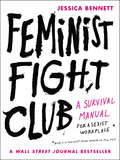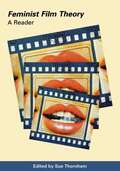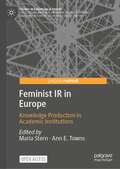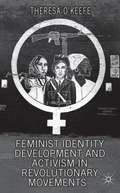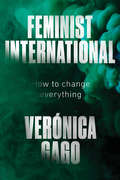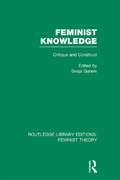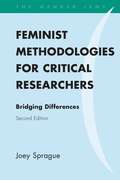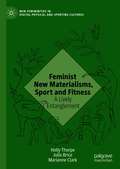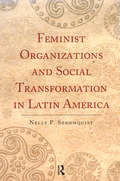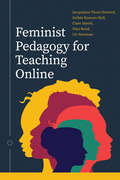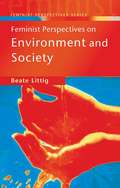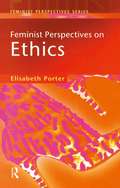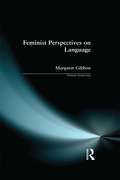- Table View
- List View
Feminist Challenges: Social and Political Theory (Routledge Revivals)
by Carole Pateman Elizabeth GrossIn Feminist Challenges, new and established scholars demonstrate the application of feminism in a range of academic disciplines including history, philosophy, politics, and sociology. As Carole Pateman notes in her introduction, ‘all the contributors raise some extremely far-reaching questions about the conventional assumptions and methods of contemporary social and political inquiry.’
Feminist City: A Field Guide
by Leslie KernLeslie Kern wants your city to be feminist. An intrepid feminist geographer, Kern combines memoir, theory, pop culture, and geography in this collection of essays that invites the reader to think differently about city spaces and city life. From the geography of rape culture to the politics of snow removal, the city is an ongoing site of gendered struggle. Yet the city is perhaps also our best hope for shaping new social relations based around care and justice. Taking on fear, motherhood, friendship, activism, and the joys and perils of being alone, Kern maps the city from new vantage points, laying out a feminist intersectional approach to urban histories and pathways towards different urban futures.
Feminist Criticism and Social Change: Sex, class and race in literature and culture (Routledge Library Editions: Feminist Theory)
by Judith Newton Deborah RosenfeltThis lively and controversial collection of essays sets out to theorize and practice a ‘materialist-feminist’ criticism of literature and culture. Such a criticism is based on the view that the material conditions in which men and women live are central to an understanding of culture and society. It emphasises the relation of gender to other categories of analysis, such as class and race, and considers the connection between ideology and cultural practice, and the ways in which all relations of power change with changing social and economic conditions. By presenting a wide range of work by major feminist scholars, this anthology in effect defines as well as illustrates the materialist-feminist tendency in current literary criticism. The essays in the first part of the book examine race, ideology, and the literary canon and explore the ways in which other critical discourse, such as those of deconstruction and French feminism, might be useful to a feminist and materialist criticism. The second part of the book contains examples of such criticism in practice, with studies of individual works, writers and ideas. An introduction by the editors situates the collected essays in relation both to one another and to a shared materialist/feminist project. Feminist Criticism and Social Change demonstrates the important contribution of materialist-feminist criticism to our understanding of literature and society, and fulfils a crucial need among those concerned with gender and its relation to criticism.
Feminist Cultural Studies of Science and Technology (Transformations)
by Maureen McNeilFeminist Cultural Studies of Science and Technology challenges the assumption that science is simply what scientists do, say, or write: it shows the multiple and dispersed makings of science and technology in everyday life and popular culture. This first major guide and review of the new field of feminist cultural studies of science and technology provides readers with an accessible introduction to its theories and methods. Documenting and analyzing the recent explosion of research which has appeared under the rubric of 'cultural studies of science and technology' it examines the distinctive features of the 'cultural turn' in science studies and traces the contribution feminist scholarship has made to this development. Interrogating the theoretical and methodological features it evaluates the significance of this distinctive body of research in the context of concern about public attitudes to science and contentious debates about public understanding of and engagement with science.
Feminist Cyberethics in Asia
by Agnes M. Brazal Kochurani AbrahamThe Asian continent which is composed of tiger and emerging economies, is both a big producer and consumer of computer mediated communication. Research on cyberspace in the Asian context, however, began only after the 1990's when the digital revolution spread outside the West. These initial studies which were largely dependent on Western categories, did not probe into the socio-cultural contexts in which the technologies emerged and have developed. This has changed though in the past years. This anthology hopes to contribute, in particular, to the analysis of the mutually constitutive interaction of the use of cyberspace and Asian cultures, with particular attention to ethical, feminist, and religious perspectives especially within Catholic Christianity. Core themes discussed in the contributors' essays are the democratizing potential of cyberspace, the digital/gender divide, global division of digital/virtual labor, cyber-violence against women, women's resistance as well as collusion with masculinist capitalist interests on the Net, masquerading, just internet relations, how web 2. 0 spaces are shaping dynamics of power and authority in the church, cyberspace as sacred time and space, and models of spirituality for the digital era.
Feminist Digital Humanities: Intersections in Practice (Topics in the Digital Humanities)
by Susan Brown Susan Schreibman Laura Mandell Jacqueline Wernimont Nanna Bonde Thylstrup Kristin Veel Daniela Agostinho Astrid Von Rosen Monika Barget Ravynn K. Stringfield Tanya E. Clement Jaime Lee Kirtz Nikki L. Stevens Jenny Bergenmar Cecilia Lindhé Katrine Dirckinck-Holmfeld Mark Sample Lisa Marie Rhody Dhanashree Thorat Andie SilvaFeminist digital humanities offers opportunities for exploring, exposing, and revaluing marginalized forms of knowledge and enacting new processes for creating meaning. Lisa Marie Rhody and Susan Schreibman present essays that explore digital humanities practice as rich terrain for feminist creativity and critique. The editors divide the works into three categories. In the first section, contributors offer readings that demonstrate how feminist thought can be put into operation through digital practice or via analytical approaches, methodologies, and interpretations. A second section structured around infrastructure considers how technologies of knowledge creation, publication, access, and sharing can be formed or reformed through feminist values. The final section focuses on pedagogies and proposes feminist strategies for preparing students to become critical and confident readers with and against technologies. Aimed at readers in and out of the classroom, Feminist Digital Humanities reveals the many ways scholars have pushed beyond critique to practice digital humanities in new ways. Contributors: Daniela Agostinho, Monika Barget, Jenny Bergenmar, Susan Brown, Tanya E Clement, Katrine Dirckinck-Holmfeld, Jaime Lee Kirtz, Cecilia Lindhé, Laura Mandell, Lisa Marie Rhody, Mark Sample, Susan Schreibman, Andie Silva, Nikki L. Stevens, Ravynn K. Stringfield, Dhanashree Thorat, Nanna Bonde Thylstrup, Kristin Veel, Astrid von Rosen, and Jacqueline Wernimont
Feminist Ecologies
by Lara Stevens Peta Tait Denise VarneyThis edited volume critically engages with ecofeminist scholarship. It tracks the ongoing dialogue between women's issues and environmental change by republishing the work of pioneering scholars and activists in the field. Together with new essays by contemporary ecofeminist scholars, the book uncovers the dialectical relationship between environmental and feminist causes, the relational identities of feminists and ecofeminists, and the concept of ecofeminism as a rallying point for environmental feminism. The volume defines ecofeminism as a multidisciplinary project and will appeal to readers working within the field of Environmental Humanities.
Feminist Engagements: Reading, Resisting, and Revisioning Male Theorists in Education and Cultural Studies
by Kathleen WeilerFeminist Engagements is a collection of essays by some of the top names in feminist education, in which they read and revision the works of the major twentieth-century theorists in education and cultural studies.
Feminist Erasures: Challenging Backlash Culture
by K. Silva K. MendesFeminist Erasures presents a collection of essays that examines the state of feminism in North America and Western Europe by focusing on multiple sites such as media, politics and activism. Through individual examples, the essays reveal the extent to which feminism has been made (in)visible and (ir)relevant in contemporary Western culture.
Feminist Experiences: The Women's Movement in Four Cultures (Routledge Library Editions: Feminist Theory)
by Susan BassnettThe Women’s Movement is usually referred to as if it were a constant, global phenomenon. There are women’s movements in Europe, North and South America, Africa, the Middle East, India, Japan and Australia, and many women and men assume that they are regional manifestations of the same thing, and share a common core. Susan Bassnett has lived and been involved in the struggles of the women’s movement in the United States, Italy and the United Kingdom, and has had extensive contacts with feminists in the German Democratic Republic. On the basis of her personal experiences and study of women’s history and literature in these countries she is able to present a striking picture of the variety of feminist aims, tactics and priorities in the four countries, and of the character of the women’s movement in four very different cultures. In Italy, she focuses on the violence of the women’s movement – its intellectualism and energy. In analysing the American women’s movement she dwells on its roots in the past, and its faith in pragmatic solutions. The GDR presents completely different questions, hinging on the relationship between state socialism and feminism. In the UK, Susan Bassnett finds herself returning to that all-pervasive aspect of British life – class, and its importance for feminists. Throughout, the author writes with a double commitment: first, to furthering our understanding of the diversity of aims of women’s movements and their common ground – the no-man’s land of female existence; second, to making her book as accessible as possible to all feminists, through drawing on her own personal experience of countries in which she has lived, worked, travelled, and made friends.
Feminist Explorations of Urban China (Routledge Studies on China in Transition)
by Tsz Ting Ip, PennThis book explores gender topics related to social transitions and social struggles in the context of the urban transformations accompanying the evolving political economy of China’s New Era, here defined as the period since 2017.Analyzing a range of feminist perspectives, and empirically based feminist research, this book investigates the ways in which national policies and campaigns imposed under the discursive political framing of the New Era seep into the everyday lives of people, influencing how societies are transformed and how urban spaces, gendered social practices, lived experiences, and subjectivities are being (re)shaped and modified. Through explorations of these aspects of the New Era, this book reveals the new challenges and possibilities faced by different gendered social groups in contemporary Chinese society.Providing rich deliberations on gender topics related to urban developments in China’s New Era, this book will be of great interest to students and scholars of China studies, gender and women’s studies, and urban studies.
Feminist Fight Club: An Office Survival Manual for a Sexist Workplace
by Jessica BennettPart manual, part manifesto, a humorous yet incisive guide to navigating subtle sexism at work--a pocketbook Lean In for the Buzzfeed generation that provides real-life career advice and humorous reinforcement for a new generation of professional women.It was a fight club--but without the fighting and without the men. Every month, the women would huddle in a friend's apartment to share sexist job frustrations and trade tips for how best to tackle them. Once upon a time, you might have called them a consciousness-raising group. But the problems of today's working world are more subtle, less pronounced, harder to identify--and, if Ellen Pao is any indication, harder to prove--than those of their foremothers. These women weren't just there to vent. They needed battle tactics. And so the fight club was born.Hard-hitting and entertaining, Feminist Fight Club blends personal stories with research, statistics, infographics, and no-bullsh*t expert advice. Bennett offers a new vocabulary for the sexist workplace archetypes women encounter everyday--such as the Manterrupter who talks over female colleagues in meetings or the Himitator who appropriates their ideas--and provides practical hacks for navigating other gender landmines in today's working world. With original illustrations, Feminist Mad Libs, a Negotiation Cheat Sheet, as well as fascinating historical research and a kit for "How to Start Your Own Club," Feminist Fight Club tackles both the external (sexist) and internal (self-sabotaging) behaviors that plague today's women--as well as the system that perpetuates them.
Feminist Film Theory: A Reader
by Sue ThornhamFor the past twenty-five years, cinema has been a vital terrain on which feminist debates about culture, representation, and identity have been fought. This anthology charts the history of those debates, bringing together the key, classic essays in feminist film theory. <p><p> This book maps the impact of major theoretical developments on this growing field-from structuralism and psychoanalysis in the 1970s, to post-colonial theory, queer theory, and postmodernism in the 1990s. Covering a wide range of topics, including oppressive images, "woman" as fetishized object of desire, female spectatorship, and the cinematic pleasures of black women and lesbian women, the book is an indispensable reference for scholars and students in the field.
Feminist Global Health Policy: Addressing Health Inequalities through an Intersectional Perspective (BestMasters)
by Hannah EgerHealth inequalities, primarily driven by the structural determinants of health, are a major concern towards the global goal of health for all. A feminist global health policy has the potential to address the unequal distribution of power and to dismantle these imbalances. The prioritisation of intersectional, holistic, human rights-based approaches intends to advance health equality and reproductive justice. This research examined the contours and potentials of a feminist global health policy by developing a framework. Online focus groups were conducted with participants affiliated to either the global-academic or local-activist level, envisaging global representation. The elaborated framework provides a nexus between the global and the local level, by entailing universal principles as well as recommendations and sensitivity for context-specific adaptations. Community and policymakers are identified as key actors. This research aims to stimulate a debate on feminist global health policy and the potential of this framework with regard to health equality and reproductive justice.
Feminist IR in Europe: Knowledge Production in Academic Institutions (Trends in European IR Theory)
by Maria Stern Ann E. TownsThe aim of this open access book is to take stock of, critically engage, and celebrate feminist IR scholarship produced in Europe. Organized thematically, the volume highlights a wealth of excellent scholarship, while also focusing on the politics of location and the international political economy of feminist knowledge production. Who are some of the central feminist scholars located in Europe? How might the concentration of these scholars in Northern Europe and the UK shape the contents of their scholarship? What have some of the main contributions been, in the study of the following themes: security; war and military; peace; migration; international political economy and development; foreign policy; diplomacy; and global governance and international organizations? The volume offers both an intellectual history and a sociology of feminist IR scholarship in Europe. It showcases the vitality and breadth of feminist IR traditions, while simultaneously calling attention to their partial nature, exclusions and silences.
Feminist Identity Development and Activism in Revolutionary Movements
by Theresa O’KeefeThis book examines how many women active in revolutionary movements develop feminist identities and how this identity simultaneously contributes to and conflicts with the struggle for women's emancipation.
Feminist International: How to Change Everything
by Veronica GagoLeader of Latin America&’s powerful new women&’s movement rethinks the meaning of feminist politicsRecent years have seen massive feminist mobilizations in virtually every continent, overturning social mores and repressive legislation. In this brilliant and original look at the emerging feminist international, Verónica Gago explores how the women&’s strike, as both a concept and collective experience, may be transforming the boundaries of politics as we know it.At once a gripping political analysis and a theoretically charged manifesto, Feminist International draws on the author&’s rich experience with radical movements to enter into ongoing debates in feminist and Marxist theory: from social reproduction and domestic work to the intertwining of financial and gender violence, as well as controversies surrounding the neo-extractivist model of development, the possibilities and limits of left populism, and the ever-vexed nexus of gender-race-class. Gago asks what another theory of power might look like, one premised on our desire to change everything.
Feminist Knowledge: Critique and Construct (Routledge Library Editions: Feminist Theory)
by Lynn Ross-BryantThe ‘minority’ feminist viewpoints have often been submerged in the interests of maintaining a mainstream, universal model of feminism. This anthology takes into account the various differences among women while looking at the important areas of feminist struggle. While sisterhood is indeed global, it certainly does not mean that all women are required to submerge their specific differences and assimilate to a universal model. Consequently, the collection includes essays by leaders in the field of post-structuralist enquiry as well as by those immersed in the new spirituality, and the social consequences of recent biological research. Other essays reflect the political struggles which continue to be waged with different strategies by socialist and radical feminists, and the self-searching analyses undertaken by feminists uneasy about their inclusion within educational institutions and the radical new interpretations of sexuality within the cultural domain. The collection begins with a critique of white mainstream feminism emanating from Aboriginal women in Australia. The implications of the critique indicate that there is a pervasive racism within the feminist movement.
Feminist Methodologies for Critical Researchers: Bridging Differences, Second Edition
by Joey SpragueA discussion of why methodology matters & how it affects the impact of social science research on society. Sprague defends the social scientific project & then shows how to engage with this project in ways that embody feminist values while producing first rate research results.
Feminist New Materialisms, Sport and Fitness: A Lively Entanglement (New Femininities in Digital, Physical and Sporting Cultures)
by Holly Thorpe Julie Brice Marianne ClarkThis book offers the first critical examination of the contributions of feminist new materialist thought to the study of sport, fitness, and physical culture. Bringing feminist new materialist theory into a lively dialogue with sport studies, it highlights the possibilities and challenges of engaging with posthumanist and new materialist theories. With empirical examples and pedagogical offerings woven throughout, the book makes complex new materialist concepts and theories highly accessible. It vividly illustrates sporting matter as lively, vital, and agentic. Engaging specifically with the methodological, theoretical, ethical and political challenges of feminist new materialisms, it elaborates understandings of moving bodies and their entanglements with human, non-human, technological, biological, cultural, and environmental forces in contemporary society. This book extends humanist, representationalist, and discursive approaches that have characterized the landscape of critical research on active bodies, and invites new imaginings and articulations for sport and moving bodies in uncertain times and unknown futures.View the video abstracts for each of the book's chapter here: Chapter 1 https://www.youtube.com/watch?v=3UQy7aq1k20&list=PLdbxSLlj0ri04cOHxK37TfaQg0IAv6Znf&index=1 Chapter 2 https://www.youtube.com/watch?v=yM-Q4FmW6h8&list=PLdbxSLlj0ri04cOHxK37TfaQg0IAv6Znf&index=2 Chapter 3 https://www.youtube.com/watch?v=D0VxosyyrKg&list=PLdbxSLlj0ri04cOHxK37TfaQg0IAv6Znf&index=3 Chapter 4 https://www.youtube.com/watch?v=eN9b58fPISA&list=PLdbxSLlj0ri04cOHxK37TfaQg0IAv6Znf&index=4 Chapter 5 https://www.youtube.com/watch?v=GM3Ss_Tz0ZY&list=PLdbxSLlj0ri04cOHxK37TfaQg0IAv6Znf&index=5 Chapter 6 https://www.youtube.com/watch?v=pNbSBThlR6s&list=PLdbxSLlj0ri04cOHxK37TfaQg0IAv6Znf&index=6 Chapter 7 https://www.youtube.com/watch?v=NFRAGwH8UOY&list=PLdbxSLlj0ri04cOHxK37TfaQg0IAv6Znf&index=7
Feminist Organizations and Social Transformation in Latin America
by Nelly P. StromquistAway from the public eye, but from within the structures of stable and efficient organizations, women's groups have established nongovernmental organizations (NGOs) to pursue feminist agendas. Feminist Organizations and Social Transformation in Latin America constitutes one of the first detailed analyses of the political and educational work of these organizations. Focusing on NGOs in the Dominican Republic and Peru, the book presents three case studies of feminist work, showing the careful balance they must navigate among satisfying basic needs, promoting legislation to address profound gender asymmetries, and creating countercultures essential to the development of a gender-attenuated society. In documenting the work of feminist NGOs, Stromquist identifies the ways they provide nonformal education (outside the school system) and informal learning (through experiences and internal discussions) to produce a new consciousness and assertive identities among women.
Feminist Pedagogy for Teaching Online
by Enilda Romero-Hall Jacquelyne Thoni Howard Clare Daniel Niya Bond Liv NewmanInstructors across higher education require inspiring and practical resources for creating, adapting to, and enhancing, online teaching and learning spaces. Faculty need to build collaborative, equitable and trusting online learning communities. This edited volume examines the experiences that interdisciplinary and global feminist educators have had—both their successes and their challenges—in infusing feminist pedagogical tenets into their online teaching and learning practices. Contributors consider how to promote connection, reflexivity, and embodiment; build equity, cooperation, and co-education; and create cultures of care in the online classroom. They also interrogate knowledge production, social inequality, and power. By (re)imagining feminist pedagogy as a much-needed tool and providing practical advice for using digital technology to enact these tenets in the classroom, this collection will empower educators and learners alike.
Feminist Perspectives on Environment and Society (Feminist Perspectives)
by Beate LittigFor courses in Environmental studies, Environmental Sociology, Environmental geography and Development studies; Women's studies and Women's issues options on a wide variety of degree courses. Combining theory with practice, this concise, accessible text provides a comprehensive introduction to the concepts, theories and results of environmental sociology from a feminist perspective. Within an international context it portrays in full the different feminist perspectives on environment and society, which are marginalized in mainstream research, and shows how the feminist critique on environmental sociology contributes to a more general feminist critique of society. Part of the Feminist Perspectives Series providing stimulating introductions to key feminist topics and debates written by well-known, experienced teachers in each field.
Feminist Perspectives on Ethics (Feminist Perspectives)
by Elizabeth PorterFeminist Perspectives on Ethics is a unique guide to the development of feminist thought on ethics and moral agency. Each chapter offers a survey of feminist debates on key areas: the nature of feminist ethics; intimate relationships; professional ethics; politics; sexual politics; abortion and reproductive choices. Importantly, the author draws on the range of ideological viewpoints that exist to demonstrate the rich diversity of feminism and also attempts to break down dualistic, discordant or simplistic understandings of ethics.
Feminist Perspectives on Language (Feminist Perspectives)
by Margaret GibbonThe Feminist Perspectives Series seeks to provide concise, accessible and engaging introductions to key feminist topics and debates. The texts in the series are designed to be used on a wide range of courses exploring feminist issues and are written by experienced teachers who are also well known in their respective fields. Each book in the series includes the most up-to-date statistics, research data, key sources and suggestions for further reading.Feminist Perspectives On Language provides an accessible introduction to this complex area. It redresses the balance of current feminist texts which tend to concentrate on discourse analysis and fail to connect with feminist thought in other disciplines such as sociology and politics. The text is divided into two parts, the first looks at language itself, how we learn language exploring such questions as; Does language free or trap us? Does our language affect how we come to understand the world around us? Is our language sexist? If so, does that reflect male dominance in society? and many more issues. Part Two explores questions of methodology and interpretation examining language in use, communication styles and the analysis of conversation.
